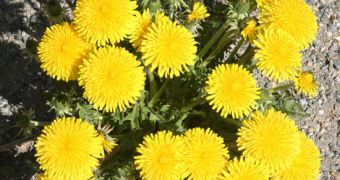A Dutch company named KeyGene and the international tire manufacturer Apollo Vredestein are now looking into the possibility of using dandelions as the primary raw material for manufacturing car tires.
By the looks of it, dandelions contain naturally occurring latex in their roots, and it is precisely this material that the researchers working closely with KeyGene and Apollo Vredestein are very much interested in.
More precisely, they believe that, given the appropriate technologies, this latex could be harvested and used to manufacture car tires. Needless to say, managing to do so would yield both environmental and financial benefits.
According to Inhabitat, the idea of growing dandelions for their rubber could easily translate into an industry worth roughly $100 billion (roughly €75 billion) yearly, simply because our society's demand for rubber stands to only increase as the years go by.
However, there is one small catch: the dandelions most people are all too familiar with are relatively small, meaning that not much latex can be extracted from their roots.
In order to solve this issue, the researchers plan on creating a hybrid species whose overall level of latex would be higher than that reported in the case of run-off-the-mill dandelions.
The scientists working on this project explain that, all things considered, said hybrid dandelions will most likely be obtained quicker than one might expect by crossing a Russian and a common plant belonging to this species.
“We are making crosses between the Russian dandelion and the common dandelion using those modern DNA profiling technologies. We're making and developing a better rubber dandelion, which produces more rubber because of an increased size,” Arjen Van Tunen, currently employed as CEO of KeyGene, recently told members of the press.
“We have developed a number of technologies which enable us to very quickly genetically improve crops in a very natural way without crossing the species barriers, but still achieving the yield improvements or the resistance improvements,” Arjen Van Tunen later elaborated on this issue.
Hopefully, more news on this topic will shortly follow.

 14 DAY TRIAL //
14 DAY TRIAL //